IN FOCUS: Are COVID-19 and streaming services ending Singapore's love of going to the cinema?

With consumers turning to streaming platforms to fill the need for entertainment while staying at home, there is heightened anxiety over the future of cinemas: Will the crowds return when the pandemic abates? (Illustration: Rafa Estrada)
SINGAPORE: More than a year into the COVID-19 pandemic, a filled cinema hall is what Mark Shaw misses the most.
For the third-generation boss of film distribution and cinema chain Shaw Theatres, there is something special about watching a movie in a full house.
“I miss the crowd,” he said. “Because for me, cinema is people cheering when Rocky gets up from the ground or hearing the gasps when Jaws is approaching and the music starts.”
“It is quite a personal experience yet that personal experience is amplified by all the people around you and I think that’s what makes cinemas special."
But the coronavirus pandemic has put the brakes on people's ability to enjoy that experience.
Cinema halls now have seats marked out to leave gaps in between movie-goers, while crowd-attracting celebrity tours and gala premieres seem like a distant memory. At one point last year, the screens here turned dark for almost four months.
That has never happened before, recalled Mr Shaw, not even during the severe acute respiratory syndrome (SARS) outbreak in 2003.
“The screens have never been down … We live and breathe cinema so it’s a terrible feeling to not be able to show films but at the same time, we know it was a necessary thing to do,” he said.
As the fight against the pandemic continues, cinema halls must remain sparsely filled, with the latest rule saying no more than 50 people can attend without pre-event testing. Food and drinks - an integral part of the movie experience for many - were banned until recently then given the green light, but masks are otherwise required at all times.
The ever-changing safety protocols are weighing down on the financials of an industry that thrives on ticket sales and even more on food and beverage (F&B) revenue.
There are also other challenges: A lack of major releases and consumers turning to streaming platforms to fill the need for entertainment while staying at home.
The latter, in particular, has heightened anxiety over the future of cinemas: Will the crowds return when the pandemic abates?

SINGAPORE’S LOVE FOR THE MOVIES
Singaporeans love going to the movies.
Official data available from 1998 showed a steady increase in cinema attendance, which hit an all-time high of 22.1 million in 2011. While that fell back to around 19 million towards the end of the last decade, the country continued to have one of the world’s highest per capita attendance rates.
Affordable ticket prices and an ample supply of accessible cinemas are among the contributing factors, said PwC Singapore’s entertainment and media leader Oliver Wilkinson.
Data showed there were 274 cinema screens operated by a mix of big and small exhibitors last year, just a notch below the all-time high of 281 screens in 2019.
“For large parts of the population around Asia, people just don’t have such ready and easy access to cinemas but almost everyone in Singapore would have access within half an hour (to a cinema) that is good quality and pretty low-cost,” said Mr Wilkinson.
The availability of a variety of movie content across languages and genres, given the country’s status as a cultural melting pot, is also another pull factor for audiences, he added.
But COVID-19 changed that.
Last year, the disruptions to cinema operations and releases saw audience numbers plunge to 4.7 million – the lowest ever based on data compiled by the Singapore Film Commission and made available on the website of the Singapore Department of Statistics.
Box office takings fell from S$175.4 million in 2019 to S$49.6 million last year.
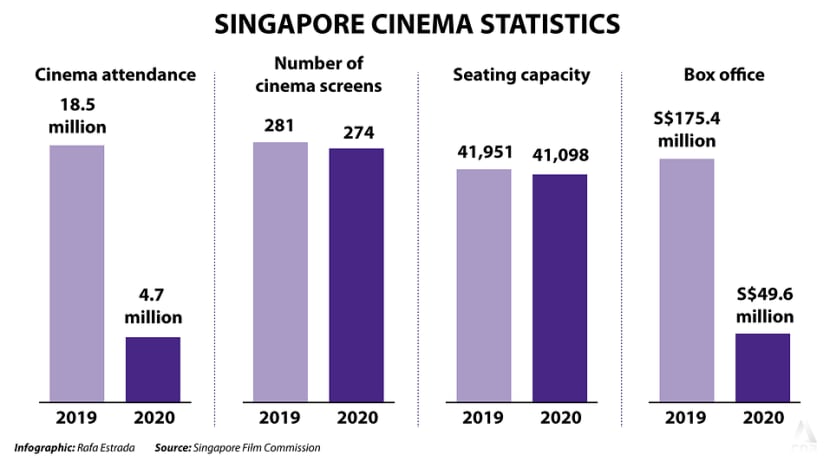
Eternality Tan, 33, said he waited “for a fortnight or so” after cinemas reopened last year before returning to his usual movie haunts like The Projector and the Oldham Theatre.
“To be honest, even for a huge film enthusiast like me, it did take me a while to go back to the cinemas,” said the vice-chairman and programming director at the Singapore Film Society. “Just to see what’s happening in the first few weeks, assess whether it’s safe and all."
Still, he has dialled back on the frequency. The 33-year-old used to watch at least one or two movies in the cinemas a week, but now catches two or three a month.
“It’s also the content available … but from what I see, consumers in general have been slow to return.”
"WAY BELOW" BREAKEVEN
Coping with the pandemic’s relentless hits over the past year has been “quite a journey” for Karen Tan who runs The Projector. When early signs of COVID-19 emerged in January last year, the independent arthouse cinema along Beach Road was seeing its best month since opening in 2014, she recalled.
The cinema’s films, known to be more unusual and niche than the mainstream releases offered elsewhere, were gaining traction and attracting more audiences. Its spaces were also used for events such as film festivals, stand-up comedies and other live performances, and its calendar was fast filling up, Ms Tan said.
“We were really taking off so we thought 2020 is going to be a great year - famous last words – and later on, we kind of stepped off the edge of the cliff.”
Like others in the industry, having to take a hiatus at end-March as the Government shut all entertainment venues was a worrying turn of events.
READ: COVID-19 shutdown: How Singapore’s cinemas, bars and theatre groups are coping
“I do remember the day we had to shut. Most of the team was there and everyone felt a bit sentimental because you know when the lights go out, especially for cinema, it’s quite visual,” said Ms Tan.
Cinemas here reopened in July last year but since then, mandatory cuts in capacities – at varying levels as Singapore moved through the different phases of reopening – have been painful despite operators launching online merchandise sales or offering their spaces for other uses such as marriage proposals.
More recently when safety protocols were tightened in May, The Projector took another hiatus – this time voluntarily to cope with “the worst set of restrictions without equivalent support”, said general manager Prashant Somosundram.
Under what authorities called the “heightened alert” of Phase 2, no F&B consumption was allowed at cinemas and up to 50 people were allowed in each hall without pre-event testing. The latter means that a typical cinema hall, which seats between 100 and 200 people, will operate at just a quarter to half its usual capacity.
“This is a return to Phase 1 but without F&B and even lesser support,” said Mr Somosundram, adding that food sales are critical not just because they make up about half of a cinema’s revenue but they also complement the movie-going experience.
The Projector has since reopened but as of mid-June, visitor levels are down nearly 80 per cent.
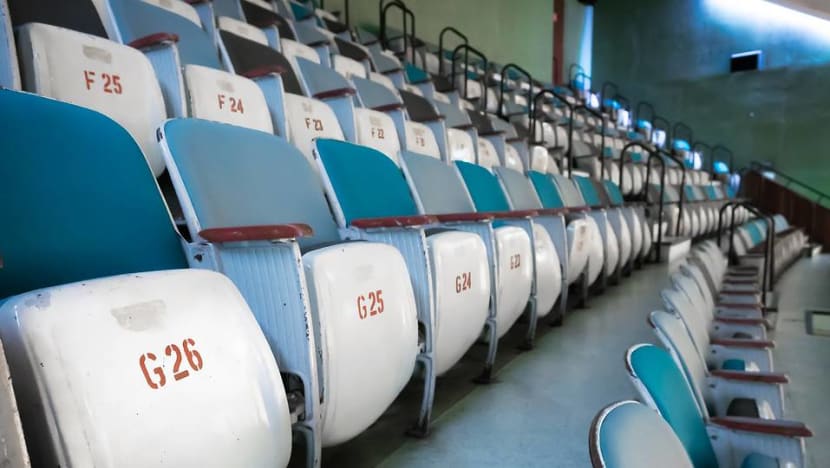
It’s not just the smaller players that are hurting.
Golden Village, Singapore’s largest cinema chain with 14 outlets, described the past year as a “start-stop year” and that it is “an understatement” to say COVID-19 has adversely affected global cinemas.
“It is estimated that movie halls across the world lost US$32 billion in 2020, or a 71.5 per cent reduction in revenue. In Singapore, the situation is pretty much the same,” said chief executive Clara Cheo.
Shaw Theatres, the second largest player here with nine cinemas, said it is operating “way below” its breakeven capacity number.
For Mr Shaw, a huge reason was a lack of major releases as movie studios opted to postpone their most expensive action flicks amid lockdowns in the bigger markets such as United States and Europe.
These include major Hollywood tentpole movies like the new James Bond film No Time To Die and Marvel’s Black Widow.
Those that did stay on last year’s release schedule, such as superhero film Wonder Woman 1984, period fantasy drama Mulan and thriller Tenet, were few and far in between, industry players said.
"We don't have the capacities to make cinemas financially viable right now and I think that is maybe 60 to 70 per cent caused by the lack of movies,” said Mr Shaw.

STREAMING THREAT
At the same time, audiences have picked up new viewing habits with on-demand streaming services making further headway.
“We were always anticipating this kind of growth but COVID-19 has made it a little faster and sooner by about a year or so,” said Mr Wilkinson.
Current estimates by PwC put the compound annual growth rate of revenue from over-the-top (OTT) video here to be at 15.3 per cent between 2019 and 2024. Of which, subscription video-on-demand platforms that include Netflix and Disney+ make up the bulk of growth.
Even cinema operators have ventured into the streaming space – Shaw Organisation’s Kinolounge and The Projector’s Projector Plus were launched last year.
Both said their new pay-per-view streaming platforms complement their physical cinemas by featuring niche content, such as older titles, festival films and even local short films.
READ: Commentary: Cinemas are on life support – and could look vastly different soon
Ms Angelia Lim said the last movie she watched in the cinemas was Avengers: Endgame in 2019.
These days, she relies on Netflix for most of her entertainment needs. Her family’s preference to avoid crowded indoor spaces amid the ongoing pandemic is one reason, said the mother of one, noting that streaming platforms provide a “good enough reason” to stay home. Lately, she has also been thinking about signing up for Disney+ for its kid-friendly content.
Convenience also plays a part.
“To be honest, we haven’t run out of options,” said the 37-year-old. “And I can watch anything whenever I want, or pause the video, go off and not miss anything.”
THE CASE FOR CINEMAS
But this does not mean that people are ready to forsake the big screen and the unique experience it offers, said Mr Wilkinson.
Noting there are parallels to be drawn from the retail industry which is battling the rise of e-commerce, he explained: “People don't go to a retail store just to get the physical product – if you just want the product, you can't get that more conveniently via e commerce.
“They go because they want to browse, try something on, meet people. Overall, it’s a day out and I think that holds well with cinemas – it’s a day out with friends or family that isn’t fully replicable at home.”
Coupled with the abundance of cinema screens here and a likely recovery in consumers’ discretionary spending when the economy picks up, the industry observer said existing cinema-going habits are unlikely to change dramatically anytime soon.
“For all these reasons, I think it would be definitely an exaggeration to talk about cinemas going away after the pandemic.”
READ: Commentary: Is this the end of movie theatres in Singapore as we know it?
Industry players echoed that.
While streaming services will impact the cinema industry, it remains unclear if it will be a positive or negative one, said Ms Cheo of Golden Village, adding that some data “actually suggest that people who stream more also go to movies more”.
Even as some studios plan to release their latest movies online and in cinemas simultaneously, it is also unclear if this will be the norm going forward, the chief executive added.
“Most movies are made with the big screen in mind. When watched on a home TV, some of the essence of the movie may be lost,” she said.
“Imagine watching Avatar on TV when it was first released – it just wouldn’t do the movie and special effects justice and have the same wow factor.”
New releases online also come with additional fees for streaming subscribers, who will “definitely be weighing their options”, said Mr Ivan Lau, operations and marketing manager of EagleWings Group which owns boutique cinema EagleWings Cinematics located in KAP Mall.
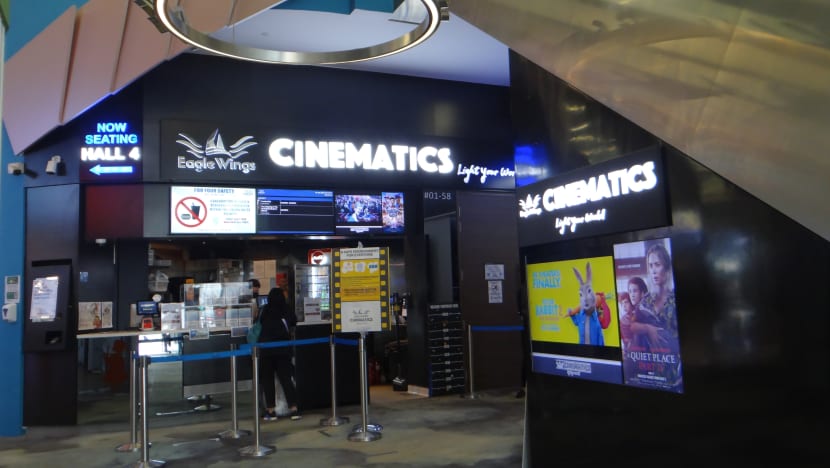
Mr Shaw pointed out that this is not the first time that the possible demise of cinemas has been debated. Over the years, there have been several apocalyptic threats including the emergence of television, videotape, DVDs and the Internet.
“Those didn’t happen and now people are saying Netflix will kill cinemas, I don’t think it’s going to be true either,” he said.
Meanwhile there are other reasons why cinemas could remain an integral part of daily life in Singapore.
For one, they play a key role in attracting footfall to retail malls throughout the day, including with late-night screenings, said Mr Wilkinson. Also, their locations on the top floors of malls usually entice people to check out other outlets as they make their way up to the theatres.
“It’s been very attractive for retail malls to have cinemas … so in that context I think cinemas can always get good deals from landlords,” he said.

As part of his role at the Singapore Film Society, Mr Tan, the film enthusiast, said he has organised several online Netflix parties – a feature on Netflix that allows multiple users to watch a film together – over the past year. Users can also tap on the chat function to leave comments.
Each online session attracted an average of 30 to 50 participants from all walks of life.
While an interesting experience, Mr Tan believes that there will still be those who prefer to head back to the cinemas, especially for films that lend themselves better to the big screen or are not readily accessible online.
For instance on a recent trip to the Oldham Theatre, he caught an old Sri Lankan film which was given a 4K restoration. It was not just a “rare opportunity” to catch a film from the South Asian country, but the 4K restoration of an old film can only be truly enjoyed in a cinema with a large screen and other technical capabilities, he said.
People are also keen to get back to a life with some degree of normality, he said, and returning to the cinemas like how it used to be before the pandemic is one thing that would help.
"It’s like exorcising the ghosts of the pandemic.”
“LIGHT AT THE END OF THE TUNNEL”
With that, industry players seem reasonably confident that crowds will return to the cinemas – it’s just a case of when.
Progress in the country’s vaccination programme, as well as around key markets such as the United States, is one cause for optimism, they said.
Cinemas are also hoping the line-up of pandemic-postponed blockbusters will lure audiences back. Among the first out of the gate is the ninth instalment of the popular Fast & Furious franchise, which officially opened in Singapore this week.
The latest in the racing film franchise already shattered pandemic box office records during its first weekend in the United States, with one media report calling it “the strongest sign yet that life is left in movie theatres”.
READ: Fast & Furious 9 puts charge back into US movie theatres with US$70m opening
Others coming up include Marvel’s superhero film Black Widow, DC comics film The Suicide Squad and action movie Top Gun Maverick.
“There is light at the end of the tunnel as the situation in the US has improved and studios are starting to schedule new releases,” said Mr Lau.
Mr Shaw reckoned that a box office recovery could “come pretty quickly with the huge pent-up stream of films” but he quickly added that operators will only be “doing as well as (they) are allowed to”.
“It’s going to be entirely up to the rules and regulations as to how many people will and can come to the cinemas,” he said.

Golden Village’s Ms Cheo noted that if reduced cinema capacities are to be extended into the last quarter of 2021 and beyond, more support may be needed.
That is why some operators are hoping for the current 50-person cap on attendance to be lifted.
While cinema halls can admit up to 250 people as long as they conduct pre-event testing, it “wouldn’t stack economically” for operators to do so, said Ms Tan from The Projector.
First, cinemas find it hard to absorb the cost of these tests and the hiring of additional manpower to administer them. DIY test kits are also out of the question as they cost around the same price as a movie ticket.
READ: Cinemas, religious organisations to cut capacity to 100 people to avoid pre-event testing requirement
Ms Tan is also unsure if cinema-goers will want to put up with the extra cost and inconvenience of pre-event testing for a movie.
“We hope to go back to at least Phase 3 measures of 50 per cent capacity with social distancing. Given that there were no COVID-19 clusters in cinemas under those measures, it possibly represents a balance between viability for the cinema operators and safety for customers,” she said.
NEW EXPERIENCES FOR THE FUTURE?
That said, Ms Cheo noted there are “many opportunities” ahead for the industry here to not just recover, but also potentially grow.
“As compared to other developed markets, Singapore has room to grow in terms of average box office spending and per capita cinema attendance,” she said.
The way forward, according to Golden Village, is to have “quality offerings in quality settings” such as its “new-generation cinemas”.
One of them will be the upcoming outlet in Katong, which will be the first Golden Village cinema with “a new integrated concept” for people to watch a movie and enjoy other lifestyle activities. More details will be announced when ready, said Ms Cheo.
Last year, the company also entered into a proposed merger with Cathay Cineplexes, the third biggest cinema chain in Singapore. Both chains stated in the filing that they hope a merger will bring in more investors and create economies of scale.
READ: Golden Village-Cathay merger proposed; will become Singapore's largest cinema operator if approved
Asked for an update on this possibly market-changing move, Ms Cheo would only say that both parties are currently at the due diligence stage and are also in talks with the Competition and Consumer Commission of Singapore. A joint statement will be made when there is a material update.
Smaller operators are also banking on unique experiences to set them apart.
EagleWings Cinematics, for instance, has already converted one of its standard halls into one that is more premium with fewer seats, side tables for meals and access to its lounge.
It has three other premium halls of different grades – each fitted with different sofa types and capacities – but they all allow customers to order dishes such as a lobster risotto from its restaurant and be served by a butler while watching a movie.
“We know that going the normal cinema route and competing based on content alone may not be feasible, that is why why four out of five of our halls are premium halls,” said its spokesman Mr Lau. “The niche we want to carve out is the luxurious experience that is not too expensive.”
Its premium halls that seat between 12 to 18 people are also more pocket-friendly for those who want to rent the space for marriage proposals, birthday parties and other events, he added.
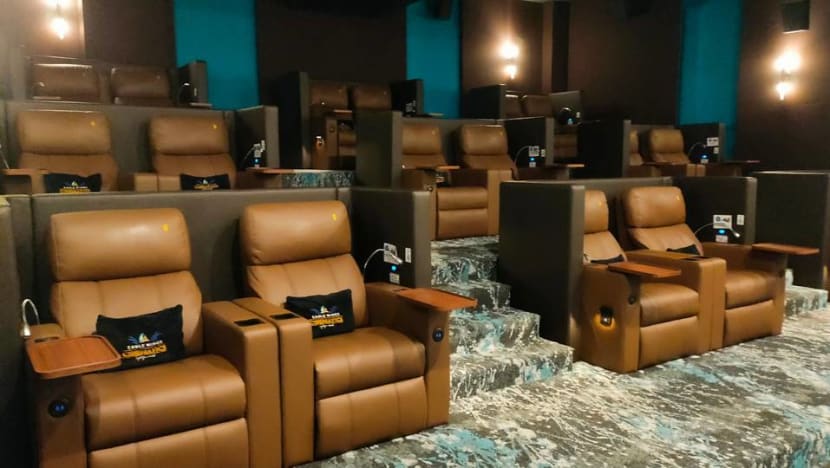
Meanwhile, The Projector is about two months into its pop-up initiative – a 48-seat cinema, cafe-bar and creative space located in Clarke Quay that was transformed out of an abandoned Chinese nightclub.
Projector X, as it is called, will be on until the end of next year.
Apart from socially-distanced seats, Ms Tan, who started The Projector from two disused cinema halls on the fifth floor of Golden Mile Tower, said the team preserved many original details of the club such as the changing rooms formerly used by hostesses and upcycled chairs and TV screens that were left behind.
More importantly, the pop-up project allows experimentation with new cinema experiences such as food pairings with film.
“When we opened Projector X, I think a lot of eyebrows were raised but for us, it was also a good opportunity to do something positive in a whole negative landscape," said the founder.
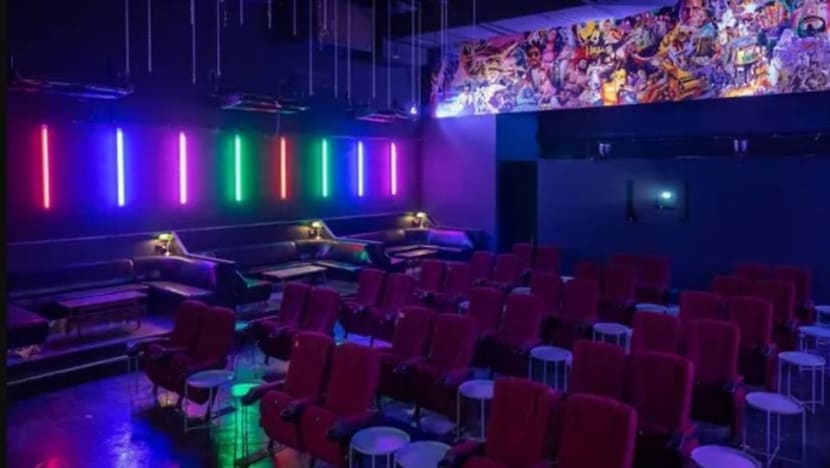
Ms Tan and her team are also working on a new 150-seat, single-screen cinema at Grange Road. The permanent outlet is set to open late next year or early 2023.
“Our unique selling point has always been the fact that we are not your average cinema – not just our film, but our event programming and the vibe and energy you get when you come into our space.
“I think that's something that you can’t replicate easily, and what will continue to attract people,” she said.
For Mr Shaw, while it remains too early to speculate how the pandemic will alter the cinema experience, he said operators will need to be nimble and prepared for another COVID-19-like crisis.
Shaw Theatres has already been experimenting with different concepts, such as its kid-friendly hall in Jewel Changi Airport which features child-safe edges, soft lighting and lower-than-usual sound volume during screenings.
Asked if the cinema business will remain a profitable one in future, the affable Shaw family scion nodded with a laugh: “Yes – otherwise why be in a business that you know is going to fail? Just because this is a legacy business?”
“I remember the day last year when we announced to the staff that we were closing, and I told them that we’ll be back. We did and while the situation remains difficult, this too will pass.”
BOOKMARK THIS: Our comprehensive coverage of the COVID-19 pandemic and its developments
Download our app or subscribe to our Telegram channel for the latest updates on the coronavirus outbreak: https://cna.asia/telegram















